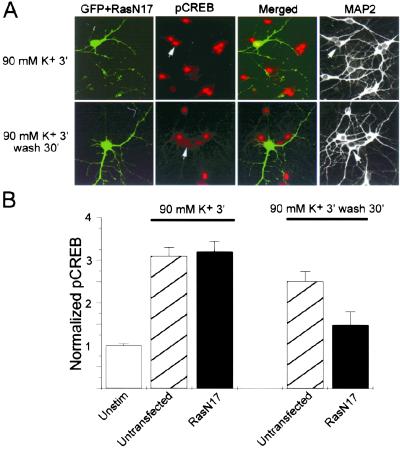Figure 3.
Ras is selectively involved in the late phase of CREB phosphorylation. (A) Hippocampal pyramidal neurons from cultures 7 days in vitro were cotransfected with dominant-negative Ras (RasN17) and EGFP, then stimulated and fixed for immunocytochemistry 24 h later. pCREB staining is represented by red, EGFP marking the transfected cells is represented by green, and in the merged image, the conjunction of red and green appears as yellow. Note the robust CREB phosphorylation (yellow nucleus in the merged image) at the early time point (90 mM K+ 3′) and the selectively reduced CREB phosphorylation at the late time point (wash 30′) in the transfected cells. MAP2 staining was used to identify all of the neurons; this is shown at the right in white. (B) Summary data are graphed below the representative examples. Dominant-negative Ras had no effect at the early time point (P > 0.2), but produced a partial inhibition at the late time point (P < 0.01), demonstrating that the MAPK pathway is selectively involved in the late phase but not the early phase of depolarization-induced CREB phosphorylation, consistent with the PD98059 results. Values are mean ± 1 SEM, n > 50 neurons for each condition.

